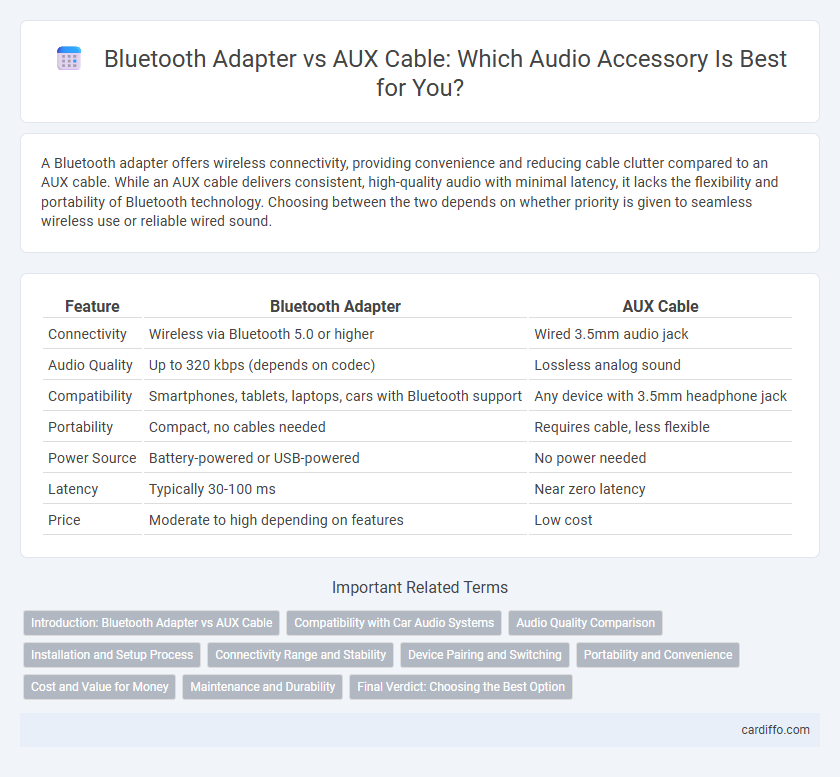A Bluetooth adapter offers wireless connectivity, providing convenience and reducing cable clutter compared to an AUX cable. While an AUX cable delivers consistent, high-quality audio with minimal latency, it lacks the flexibility and portability of Bluetooth technology. Choosing between the two depends on whether priority is given to seamless wireless use or reliable wired sound.
Table of Comparison
| Feature | Bluetooth Adapter | AUX Cable |
|---|---|---|
| Connectivity | Wireless via Bluetooth 5.0 or higher | Wired 3.5mm audio jack |
| Audio Quality | Up to 320 kbps (depends on codec) | Lossless analog sound |
| Compatibility | Smartphones, tablets, laptops, cars with Bluetooth support | Any device with 3.5mm headphone jack |
| Portability | Compact, no cables needed | Requires cable, less flexible |
| Power Source | Battery-powered or USB-powered | No power needed |
| Latency | Typically 30-100 ms | Near zero latency |
| Price | Moderate to high depending on features | Low cost |
Introduction: Bluetooth Adapter vs AUX Cable
Bluetooth adapters enable wireless audio streaming by converting devices without built-in Bluetooth into wireless receivers, offering convenience and mobility. AUX cables provide a direct wired connection that delivers consistent audio quality with minimal latency, ideal for stable sound transmission. Choosing between these accessories depends on the need for wireless flexibility versus reliable, interference-free audio performance.
Compatibility with Car Audio Systems
Bluetooth adapters offer wireless connectivity compatible with most modern car audio systems equipped with Bluetooth receivers, enabling seamless streaming from smartphones and other devices. AUX cables provide a reliable wired connection compatible with virtually all car stereos featuring a 3.5mm auxiliary input, ensuring consistent audio quality without wireless interference. While Bluetooth adapters support hands-free calls and advanced controls, AUX cables maintain universal compatibility regardless of car model or year.
Audio Quality Comparison
Bluetooth adapters provide wireless audio transmission with convenience but may introduce compression artifacts, impacting sound clarity and dynamic range compared to wired connections. AUX cables deliver uncompressed analog signals, ensuring consistent audio fidelity with minimal latency, preserving the original sound quality from the source device. For audiophiles prioritizing high-quality sound, AUX cables generally offer superior audio performance over Bluetooth adapters.
Installation and Setup Process
Bluetooth adapters offer a hassle-free installation with wireless connectivity, requiring only pairing with devices and minimal configuration. AUX cables demand a physical connection to the audio jack, which may limit mobility and require careful cable management. Installing a Bluetooth adapter enhances convenience and reduces clutter compared to the straightforward but wired setup of an AUX cable.
Connectivity Range and Stability
Bluetooth adapters offer wireless connectivity with a typical range of up to 30 feet, providing freedom from cables but potential signal interference from walls or electronic devices. AUX cables deliver a stable, direct connection with virtually no latency or signal drop, limited only by the cable length, usually no more than 6 feet for practical use. For users prioritizing consistent audio quality and minimal interruptions, AUX cables ensure superior stability, whereas Bluetooth adapters balance convenience with moderate range and stability.
Device Pairing and Switching
Bluetooth adapters enable seamless device pairing and easy switching between multiple devices without physical connections, enhancing user convenience and reducing cable clutter. AUX cables require manual plugging and unplugging for each device, limiting quick transitions and increasing wear on ports. Preference for Bluetooth adapters grows with the need for wireless flexibility and efficient device management in modern accessory setups.
Portability and Convenience
Bluetooth adapters offer superior portability and convenience compared to AUX cables by eliminating the need for physical connections, allowing wireless audio transmission within a typical range of 10 meters. This wireless capability reduces cable clutter and enables flexible device placement, making it ideal for on-the-go use and seamless switching between multiple devices. AUX cables, while reliable for direct connections, require carrying extra accessories and can be prone to tangling, limiting ease of use in mobile or dynamic environments.
Cost and Value for Money
Bluetooth adapters typically offer greater value for money due to their wireless convenience and compatibility with multiple devices, often priced between $10 and $30. AUX cables are generally cheaper, ranging from $5 to $15, but lack the flexibility and modern usability of Bluetooth technology. Considering both cost and functionality, Bluetooth adapters provide a more versatile and long-term investment for most users.
Maintenance and Durability
Bluetooth adapters offer enhanced durability with no physical cables to wear out or tangle, reducing maintenance efforts compared to AUX cables. AUX cables, prone to fraying, connector damage, and signal degradation, require regular inspection and replacement to maintain optimal audio performance. Choosing a Bluetooth adapter ensures a longer-lasting, low-maintenance audio connection ideal for frequent use and mobility.
Final Verdict: Choosing the Best Option
Bluetooth adapters offer wireless convenience and compatibility with modern devices, making them ideal for users prioritizing mobility and ease of use. AUX cables provide reliable, low-latency audio transmission and are preferred for situations demanding stable sound quality without interference. Choosing the best option depends on whether wireless freedom or consistent audio performance is the primary requirement.
Bluetooth adapter vs AUX cable Infographic

 cardiffo.com
cardiffo.com